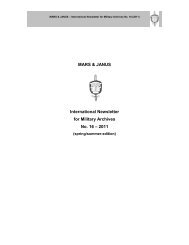National Experiences - British Commission for Military History
National Experiences - British Commission for Military History
National Experiences - British Commission for Military History
You also want an ePaper? Increase the reach of your titles
YUMPU automatically turns print PDFs into web optimized ePapers that Google loves.
94 ai r p o w e r in 20 t H Ce n t u ry do C t r i n e s a n d em p l o y m e n t - nat i o n a l ex p e r i e n C e s<br />
with nothing but the passive acknowledgement of <strong>for</strong>eign publications on the theory<br />
of air war. Lieutenant Colonel Hilmer Freiherr v. Bülow, the advisor <strong>for</strong> aviation<br />
matters at the “Truppenamt” (Troop Office), which actually assumed the tasks of<br />
the <strong>for</strong>bidden “Major General Staff” within the Army Command, was responsible<br />
<strong>for</strong> this task. There<strong>for</strong>e it does not come as a surprise that Bülow’s “Richtlinien für<br />
die Führung des operativen Luftkriegs” (Guidelines on the conduct of operational<br />
air war), presented in 1926, did not include his own ideas, but only reflected already<br />
published thinking on this subject, like, <strong>for</strong> example, the ideas of Douhet or Mitchell.<br />
According to these guidelines, the new opportunities provided by “operational air<br />
war” made it possible to take “the war deep down inside the political, moral, economic<br />
and military sources of power” of an enemy state, whereby the German term<br />
“operativ” (operational) must not simply be equated with “strategisch” (strategic).<br />
Conducting air attacks on the enemy’s large cities, industrial centers, armaments<br />
industry and the food basis of the enemy, friendly air <strong>for</strong>ces were supposed to try to<br />
destroy “the enemy’s morale and his will to continue the war“. 22<br />
Erhard Milch, the Lufthansa chief executive and later Field Marshal of the Air<br />
Force, remembered – ex post – that already in April 1932, on the occasion of a dinner<br />
hosted by the prominent <strong>National</strong> Socialist and well-known World War I fighter<br />
pilot, Hermann Göring, the leader of the NSDAP party, Adolf Hitler, had been talking<br />
about General Douhet’s ideas, “which attracted attention in specialist circles at<br />
that time”. Milch said that Hitler’s interest was focused on the bomb war as the best<br />
means to deter an adversary and that he maintained that Germany needed to have “a<br />
strong Wehrmacht, with Air Force and Army being equally important (a completely<br />
new idea at that time), if it wanted to free itself from the devastating shackles of the<br />
Treaty of Versailles”. 23<br />
On 28 April 1933 the <strong>National</strong> Socialist government under Reich Chancellor<br />
Adolf Hitler set up a Reich Aviation Ministry, appointing Hermann Göring the Reich<br />
Aviation Minister. Milch became the state secretary. For him, Dr. Robert Knauss, the<br />
Lufthansa company director, wrote a memorandum entitled “Die deutsche Luftflotte”<br />
(The German Air Fleet), which Milch approved and submitted to Göring. It contained<br />
an armaments conception <strong>for</strong> the German Air Force, but also reflected the<br />
author’s deliberations on the air war of the future. 24 According to Knauss, Germany<br />
would inevitably have to face a two-front war against Poland and France to regain<br />
its position as a great power in Europe. He there<strong>for</strong>e demanded a swift build-up of a<br />
22 Cited in Klaus A. Maier, Totaler Krieg und operativer Luftkrieg, in: Klaus A. Maier/Horst Rohde/<br />
Bernd Stegemann/Hans Umbreit, Die Errichtung der Hegemonie auf dem europäischen Kontinent.<br />
Militärgeschichtliches Forschungsamt (ed.) (Das Deutsche Reich und der Zweite Weltkrieg, Vol. 2).<br />
Stuttgart 1979, p. 44.<br />
23 Cited in David Irving, Die Tragödie der Deutschen Luftwaffe. Aus den Akten und Erinnerungen von<br />
Feldmarschall Milch. Frankfurt am Main/Berlin/Wien 1970, p. 54.<br />
24 Cf. Bernhard Heimann/Joachim Schunke, Eine geheime Denkschrift zur Luftkriegskonzeption, in<br />
Zeitschrift für Militärgeschichte 3 (1964), p. 72-86.



